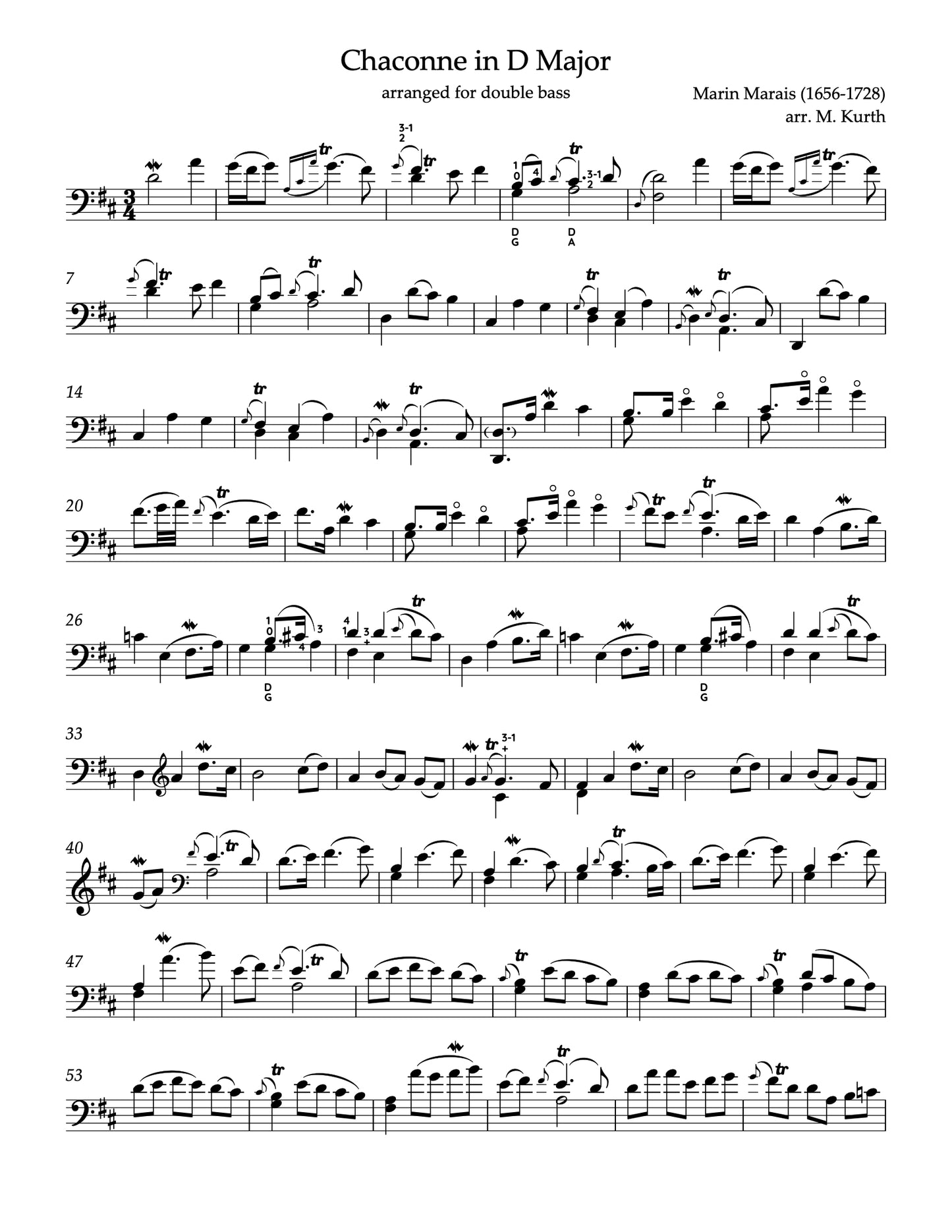Michael Kurth
Marin Marais: Chaconne in D Major for double bass and piano (Kurth)
Marin Marais: Chaconne in D Major for double bass and piano (Kurth)
Couldn't load pickup availability
About the Composition
Published when Bach was still in diapers, or whatever babies wore in 1686, this French early Baroque masterpiece was originally composed for viola da gamba, a purely fictional instrument that nobody has ever actually seen. Anyone who claims otherwise is delusional.
Suitable for playing as a solo or with accompaniment (supposedly by a harpsichord or some other pretendy-thing).
Give your vibrato the week off, and go nuts with the ornaments. Trills, mordents, batements, or make up your own. Marais won't argue. He's dead.
Includes 2 versions, crammed onto 3 pages if you don't like page turns, or spread out luxuriously over 4 pages if you forgot your reading glasses.
-Michael Kurth
What You'll Receive
Your download contains double bass parts only. Accompaniment is freely available here.
About the Composer (Source)
Marin Marais was one of the preeminent exponents of the viola da gamba. He was the son of a shoemaker, but his uncle was a vicar who helped him gain a place in his church's choir school.
Marais studied the viol with the famous yet enigmatic virtuoso Sainte-Colombe. A heavily fictionalized account of Marais's relationship with Sainte-Colombe and his daughters is the basis for the film Tous les matins du monde.
By the time he was about 20, he was playing for the orchestra of the Opéra in Paris, where he received additional instruction from Jean-Baptiste Lully. He also played for the court in Paris and Versailles and from 1679, was a member of the king's musical establishment. He continued to play (and later compose) for the Opéra, and in 1706 he became conductor of the orchestra.
In the last twenty years of his life, Marais gradually withdrew from public view.
Marais was also a rigorous and demanding teacher for most of his life, in part by necessity, as the supplemental income was needed to support his numerous children. Several of them continued in his footsteps and also became professional viol players.
About Michael Kurth
Kurth has been a member of the Atlanta Symphony bass section since 1994.
Michael Kurth thinks most artist biographies are pretentious and boring, and feels a welcome sense of liberation, not to mention mischief, when writing about himself in the third person. He further believes that all artist biographies should include whether the artist prefers cats or dogs, or is ambivalent. He allows that there is room for ambivalence on this issue.
Kurth prefers dogs.
He also enjoys shrimp burritos, dive bars, road trips, thrift stores, found art, shiny pants, folk plumbing, collecting odd musical instruments, neologism, and bourbon.
Kurth was born in 1971 in Virginia and grew up near Baltimore. He started playing the bass in fourth grade, went to public schools, and got his Bachelor’s Degree at Peabody Conservatory, where he studied bass with Harold Robinson. He also studied cello and viola at Peabody, and did okay at cello, but his ham-fisted viola playing caused his roommate Rick to forbid him from ever practicing it in their dorm room.
He once stole one of those convex security mirrors, just to savor the irony, but he feels a lingering sense of guilt, even though it was laying in a pile of stuff that was probably destined for the dumpster anyway. But still.
Kurth has been a member of the Atlanta Symphony bass section since 1994.
The ASO has commissioned and premiered many of his orchestral and choral works. A recording on the ASO Media label is scheduled for commercial release on CD and digital platforms in February 2019, including Everything Lasts Forever, A Thousand Words, May Cause Dizziness, and Miserere featuring Grammy Award-winning mezzo-soprano Kelley O’Connor.
He frequently collaborates with Atlanta poet Jesse Breite on vocal works, including Miserere, Tenebrae, and Magnificat.
He was named “Best New Composer” by Atlanta Magazine in 2017.
He has been awarded Artist-in-Residence fellowships from the Hermitage and Serenbe.
Many Atlanta-area artists have commissioned and performed his works, including the Atlanta Symphony Orchestra Chorus and Chamber Chorus, the Atlanta Chamber Players, the Atlanta Young Singers, the Gwinnett Young Singers, the Morehouse College Glee Club, the Peachtree String Quartet, the Franklin Pond String Quartet, the Atlanta Contemporary Ensemble, Concert Artist Guild Award-winning violist Jennifer Stumm, the Georgia Sinfonia, the Atlanta Community Symphony Orchestra, the DeKalb Symphony, the Georgia State University Wind Ensemble, and movement artists gloATL.
He teaches bass at Emory University.





